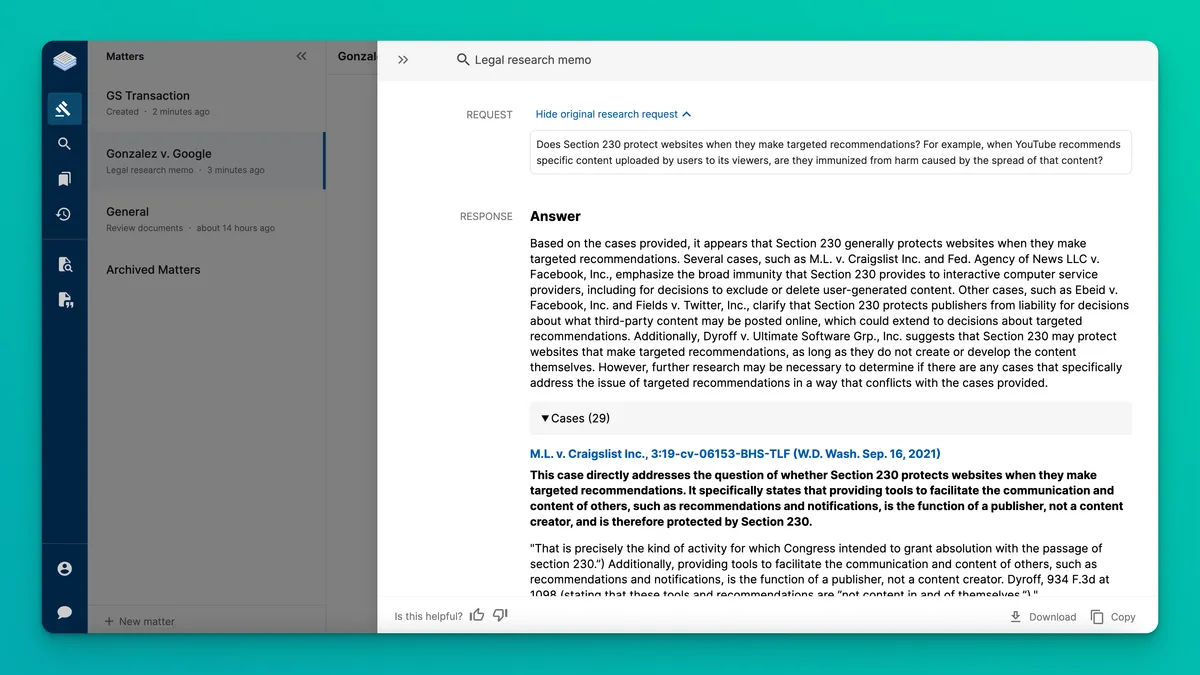In-house lawyers can use Casetext’s generative-AI powered legal assistant known as CoCounsel to research a variety of legal questions.
For example, an employment lawyer could use the tool’s “Legal research memo” application to assist with work on a case alleging unlawful retaliation under Title VII.
The attorney could ask whether protected activities under the law become unprotected if the employee performs those activities in an improper manner.
In a matter of minutes, CoCounsel produces a memo with a short answer indicating an employee’s conduct can lose protected status “if it interferes with the employee’s job duties or disrupts the workplace.”
A more detailed analysis section references pertinent cases and provides links to them, as well as relevant quotes. The technology can also pinpoint cases that have been negatively treated by the courts.
“If you're busy in-house counsel trying to do many things at once and you need a quick legal research memo, just type in your question and get it right away,” said Valerie McConnell, Casetext’s vice president of customer success.
McConnell spoke during a session of an AI-focused conference that Counselwell hosted last month.
During her presentation, she also demonstrated ways in-house attorneys could use applications in CoCounsel to review documents and handle contracting tasks.
Casetext, which Thomson Reuters recently announced it will purchase for $650 million, built CoCounsel on OpenAI’s GPT-4 large language model.
The legal department at Ford Motor Company is among the users of the cutting-edge technology.
Document review
CoCounsel’s “Review documents” function can be used for a variety of use cases, such as due diligence, e-discovery and internal investigations, McConnell said.
During a demonstration, she uploaded 10 emails from the Enron accounting scandal a couple decades back.
She then asked the technology to answer two questions about each of the documents: Does the document suggest any weird accounting practices? Does the document contain any sarcasm or humor?
McConnell said the application reviews every word of every document to answer the questions and displays its responses in a chart format.

She highlighted one of the emails for which the technology answered yes to both questions and provided explanations for its findings.
The technology’s finding of weird accounting practices was derived from a reference to an “off-balance sheet special purpose vehicle.”
The humor and sarcasm that was detected included Sesame Street-style humor poking fun at the creative accounting practices of Enron’s board of directors.
“I asked some zany questions on purpose,” McConnell said. “You can ask hard questions of the AI to find information and evidence in documents you couldn't find otherwise.”
Additionally, she noted that users could upload far more documents than she did in the demonstration.
Contracts compliance
McConnell also detailed how in-house counsel and transactional attorneys at law firms could use a CoCounsel application called “Contract policy compliance.”
She gave the example of an attorney wanting to check whether a company master services agreement complied with a policy that all the copyright claims are subject to arbitration, so she uploaded the document and typed in the policy for review.
The technology identified that the arbitration clause exempted intellectual property claims from arbitration, which conflicted with the stated policy about such claims.
The AI-powered technology also recommended a redline to bring the noncompliant clause into compliance with the stated policy. The user could download this redline and other suggested edits in Microsoft Word, McConnell said.
Market comparison
In a related vein, McConnell showed how in-house counsel could use an application called “Market check” to determine what is typical for a specific contractual provision.
For example, a lawyer could ask the technology what the typical time period is for a noncompete clause in an asset purchase agreement.
McConnell had the tool review a database of publicly available merger agreements from the S&P 500 filed in EDGAR between 2017 and this year.
The technology identified that most of the noncompete clauses from the database specify a duration of two to three years, and it provided relevant agreements for the user’s review.
“This information should help me understand what's fair for that provision and better equip me to negotiate that term for my client,” McConnell said.
Thomson Reuters partnership
McConnell’s presentation last month came just days before the announcement that Thomson Reuters had purchased Casetext as part of its ongoing investment in AI-powered technology.
Thomson Reuters’ President and CEO Steve Hasker called the acquisition “another step in our ‘build, partner and buy’ strategy to bring generative AI solutions to our customers.”
Meanwhile, Casetext said at the time that it planned to keep following its “ambitious product roadmap and roll out exciting new features for CoCounsel.”
“Once the deal completes customary regulatory reviews and closes, we look forward to integrating with Thomson Reuters to bring even more powerful content options and capabilities to CoCounsel,” Casetext wrote on its website.
For example, McConnell said during her demo that the company planned to expand its legal research memo application to cover more than just U.S. law.



















